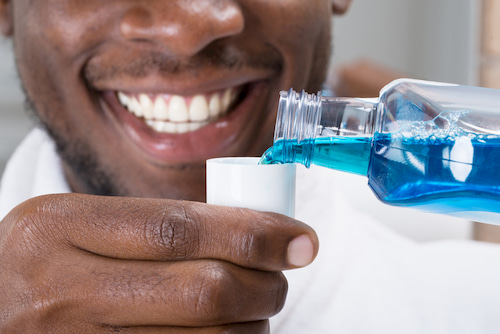 Regular rinsing with specific types of mouthwash can actually bring relief to many who suffer from tooth sensitivity. A mouthwash for sensitive teeth contains ingredients that help numb nerve endings and strengthen tooth enamel, and it can be used along with similar toothpaste or on its own. Studies indicate that mouthwashes may be as good as toothpaste at reducing sensitivity.
Regular rinsing with specific types of mouthwash can actually bring relief to many who suffer from tooth sensitivity. A mouthwash for sensitive teeth contains ingredients that help numb nerve endings and strengthen tooth enamel, and it can be used along with similar toothpaste or on its own. Studies indicate that mouthwashes may be as good as toothpaste at reducing sensitivity.
Tooth Sensitivity
Depending on the cause, according to the American Dental Association (ADA), using desensitizing dental products as home treatments can suppress the sensitivity. Mouthwashes desensitize teeth in two major ways: by applying solutions that anesthetize the delicate tubules in the underlying dentin area of the teeth, and by coating your tooth enamel with materials that reinforce it and make it stronger. These strengthening compounds also fill in these microscopic tubules that lead into the inner tooth pulp through the dentin that lies below tooth enamel. Results don’t occur overnight, however. It takes regular use to build up the anesthetizing effect and strengthen the tooth enamel.
Desensitizing Ingredients
A range of active ingredients in mouthwash can reduce tooth sensitivity. Potassium citrate, potassium nitrate, and sodium fluoride are some of the ingredients included in commercial mouthwashes to provide relief, per a study published in the Journal of Conservative Dentistry. In addition, calcium phosphate and mineral fluorides such as stannous fluoride are used in mouthwashes to the same effect. Potassium citrate and potassium nitrate desensitize the nerves in teeth, and sodium fluoride, calcium phosphate, and stannous fluoride improve tooth enamel while coating the microscopic tubules in the dentin.
Mouthwash or Toothpaste?
It can be difficult to decide whether to use a mouthwash or a toothpaste to treat your sensitivity, but research suggests both are equally effective. In 2012, the Journal of Clinical and Experimental Dentistry published a study comparing a mouthwash and a toothpaste that contained sodium fluoride and potassium nitrate. Thirty patients have divided into two groups of fifteen: One group brushed twice a day using a toothpaste containing 5 percent potassium nitrate; and the second group rinsed twice a day with a mouthwash containing 3 percent potassium nitrate. The second group also used a non-fluoridated toothpaste. Tooth sensitivity was measured after two and four weeks. Both groups experienced a significant desensitizing effect, and there was no difference between the two groups which provided a benefit in decreasing tooth sensitivity. If you have sensitive teeth, you can use a specialty mouthwash, or a toothpaste for sensitive teeth, or both.
Sensitive teeth may be a sign of serious dental problems, so always mention any sensitivity to your dentist. He can check the source of your discomfort and offer in-office treatments. In the meantime, you can trust a mouthwash for sensitive teeth to provide you relief from current pain.
